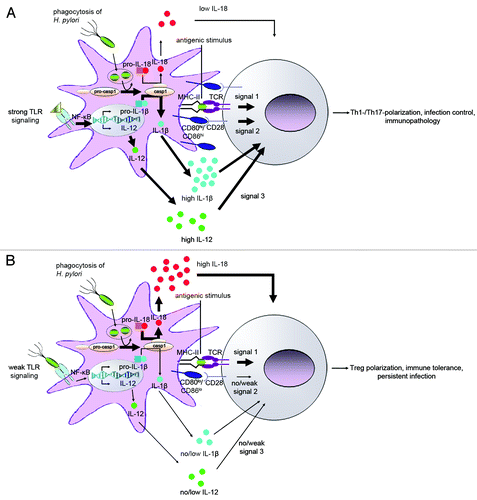Figures & data
Figure 1. Schematic representation of the DC/T-cell interface under immunogenic and tolerogenic conditions. (A) DC exposure to H. pylori in inflamed tissues, e.g., upon challenge of mice that have previously been immunized with an H. pylori-specific vaccine, results in DCs with predominantly immunogenic properties. Such immunogenic DCs are characterized by high expression of co-stimulatory molecules (CD80, CD86), abundant secretion of IL-12 and IL-1β and little if any production of IL-18. Immunogenic DCs provide three signals to T-cells: the antigenic stimulus, co-stimulatory signals and T-effector cell-inducing cytokines. The ultimate outcome is Th1/Th17 polarization, efficient control of H. pylori infection and severe T-cell-driven immunopathology. (B) Under tolerance-promoting conditions, e.g., exposure to H. pylori during the neonatal period, the uptake of H. pylori renders DCs tolerogenic; tolerogenic DCs express little or no CD80/CD86, IL-12 and IL-1β, but instead produce large amounts of IL-18 upon inflammasome and caspase-1 activation. Tolerogenic DCs provide a strong antigenic stimulus to T-cells in the absence of signals 2 and 3, and preferentially induce Treg differentiation. Strong Treg and weak T-effector responses favor immune tolerance and persistent infection and cross-protect against allergen-specific T-cell responses and allergic disease manifestations.
